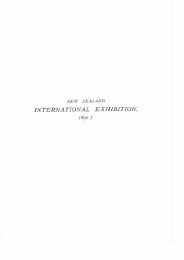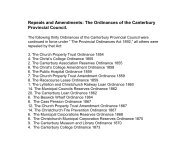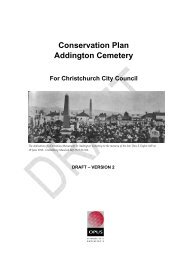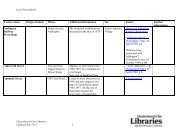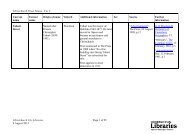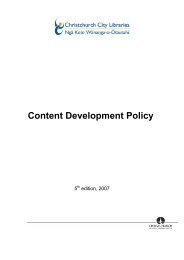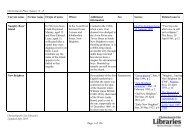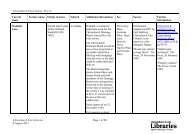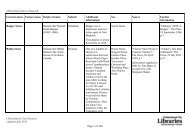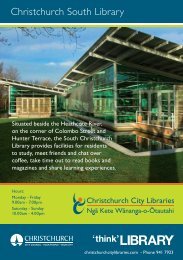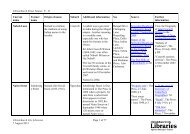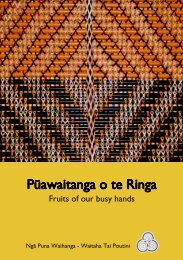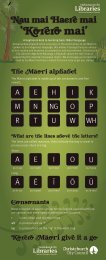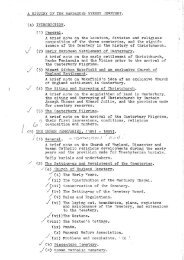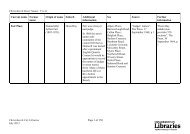Rich man, poor man, environmentalist, thief - Christchurch City ...
Rich man, poor man, environmentalist, thief - Christchurch City ...
Rich man, poor man, environmentalist, thief - Christchurch City ...
Create successful ePaper yourself
Turn your PDF publications into a flip-book with our unique Google optimized e-Paper software.
24<br />
The existence of free secular primary school education did<br />
not mean that all parents made their offspring avail themselves<br />
of it. Inspectors saw children ‘toiling like beasts of burden’<br />
before and during school hours and too tired to learn should<br />
they make it to class. Worse, youngsters were spotted ‘revelling<br />
in the dirt of the creek... [and] gutter for the greater part of<br />
the day... and... becoming habituated to idleness – the parent<br />
of vice, the foster parent of evil instincts’.<br />
Children who did attend school found themselves in large<br />
classes and promoted from one standard to the next only when<br />
they had passed examinations. Each school had substantial<br />
grounds with, down the middle, a dividing fence. Thus was<br />
play encouraged but the sexes segregated outside the classroom.<br />
James Speight and pupils at Tai Tapu School, about 1880<br />
Tai Tapu School (Consolidated) centennial celebrations, 1867–<br />
1967, p11<br />
Experienced teachers <strong>man</strong>aged some classes, while others<br />
were taught by pupil teachers. These were ‘youths of either<br />
sex, between 14 and 17 years of age’, who had passed the sixth<br />
standard and were ‘of good character... good constitution and<br />
free from any bodily or other defect or infirmity detrimental<br />
to usefulness or efficiency as a teacher’. Before or after school<br />
the headmaster gave them instruction, the sum he received<br />
for this varying according to the number of his students. At<br />
Tai Tapu, James had an assistant and one or two pupil teachers.<br />
At St Albans he had a staff of about 13, of whom over a half<br />
were pupil teachers. Should the adolescents survive a regime<br />
of small remuneration, large pupil numbers and rigorous<br />
testing, they were eventually entitled to enter the <strong>Christchurch</strong><br />
Normal School to train as teachers. However, only a minority<br />
could afford this luxury. Most of those who could <strong>man</strong>age it<br />
went straight into positions as assistants or sole teachers.<br />
Corporal punishment was widely used. The North<br />
Canterbury Education Board’s 1894 regulations on the subject<br />
stated that both boys and girls could be thus disciplined.<br />
Neither head nor neck could be touched and canes and sticks<br />
were banned in favour of a regulation strap. This was to be at<br />
least one and a half inches in breadth and could be no more<br />
than 25 inches in length, a quarter of an inch in thickness and<br />
four and three quarter ounces in weight.<br />
James moved to Kakahu, South Canterbury in 1877,<br />
becoming headmaster at Tai Tapu two years later. Then, in<br />
1887, the board sacked the headmaster of a large <strong>Christchurch</strong><br />
school, St Albans, and James was put in charge.<br />
A fundamental problem at St Albans was the poverty and<br />
consequent ill-health of pupils which caused a high level of<br />
absenteeism. This was exacerbated by the parental attitudes<br />
already described. A committee member commented that, in<br />
the street, he frequently met girls who were quite unknown to<br />
him. At an age when they should have been at school, they<br />
were instead wheeling perambulators and, as nurse girls, helping<br />
to supplement their families’ meagre incomes. As well, the<br />
population tended to be nomadic rather than stable and<br />
<strong>man</strong>ageable. A draft report commented on the ‘curse peculiar<br />
to the... school... the number of small tenements on the church<br />
property in the neighbourhood... [which] afford facilities for<br />
<strong>poor</strong> people to remain an uncertain but usually a short time in<br />
the district’.<br />
James raised money by renting out the school buildings to<br />
George Hart and Edward William Seager for their popular<br />
illustrated talks on Canterbury history. James’ son, Robert,



